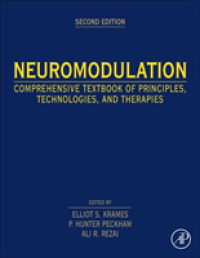- ホーム
- > 洋書
- > 英文書
- > Philosophy
Full Description
This collection of 13 new essays shows what Baruch Spinoza can add to our understanding of the relational nature of autonomy. By offering a relational understanding of the nature of individuals centred on the role played by emotions, Spinoza offers not only historical roots for contemporary debates but also broadens the current discussion. At the same time, reading Spinoza as a theorist of relational autonomy underscores the consistency of his overall metaphysical, ethical and political project, which has been clouded by the standard rationalist interpretation of his works.
Contents
Editors' IntroductionAurelia Armstrong , Keith Green and Andrea Sangiacomo
1. Relational Autonomy: State of the Art DebateCatriona Mackenzie
2. Epistemic Autonomy in Descartes, Spinoza and Kant: The Value of Thinking for OneselfUrsula Renz
3. Spinoza on the Interaction of Ideas: Biased BeliefsMartin Lenz
4. Spinoza on Natures: Aristotelian and Mechanistic Routes to Relational AutonomyMatthew Kisner
5. Spinoza's Path from Imaginative Transindividuality to Intuitive Relational Autonomy: From Fusion, Confusion and Fragmentation to Moral IntegrityHeidi M. Ravven
6. Revisiting Spinoza's concept of conatus: Degrees of AutonomyCaroline Williams
7. Bodies Politic and Civic AgreementJustin Steinberg
8. Power, Freedom and Relational AutonomyEricka Tucker
9. Spinoza on Affirmation, Anima and Autonomy: 'Shattered Spirits'Keith Green
10. A Spinozistic Approach to Relational Autonomy: The Case of ProstitutionAndrea Sangiacomo
ContributorsIndex







